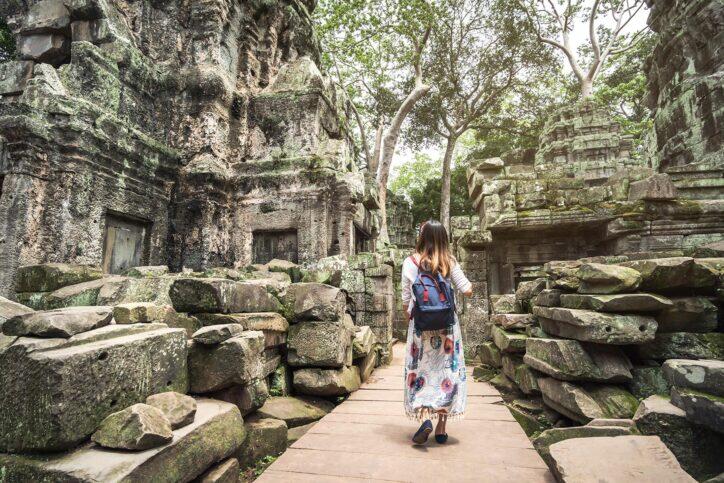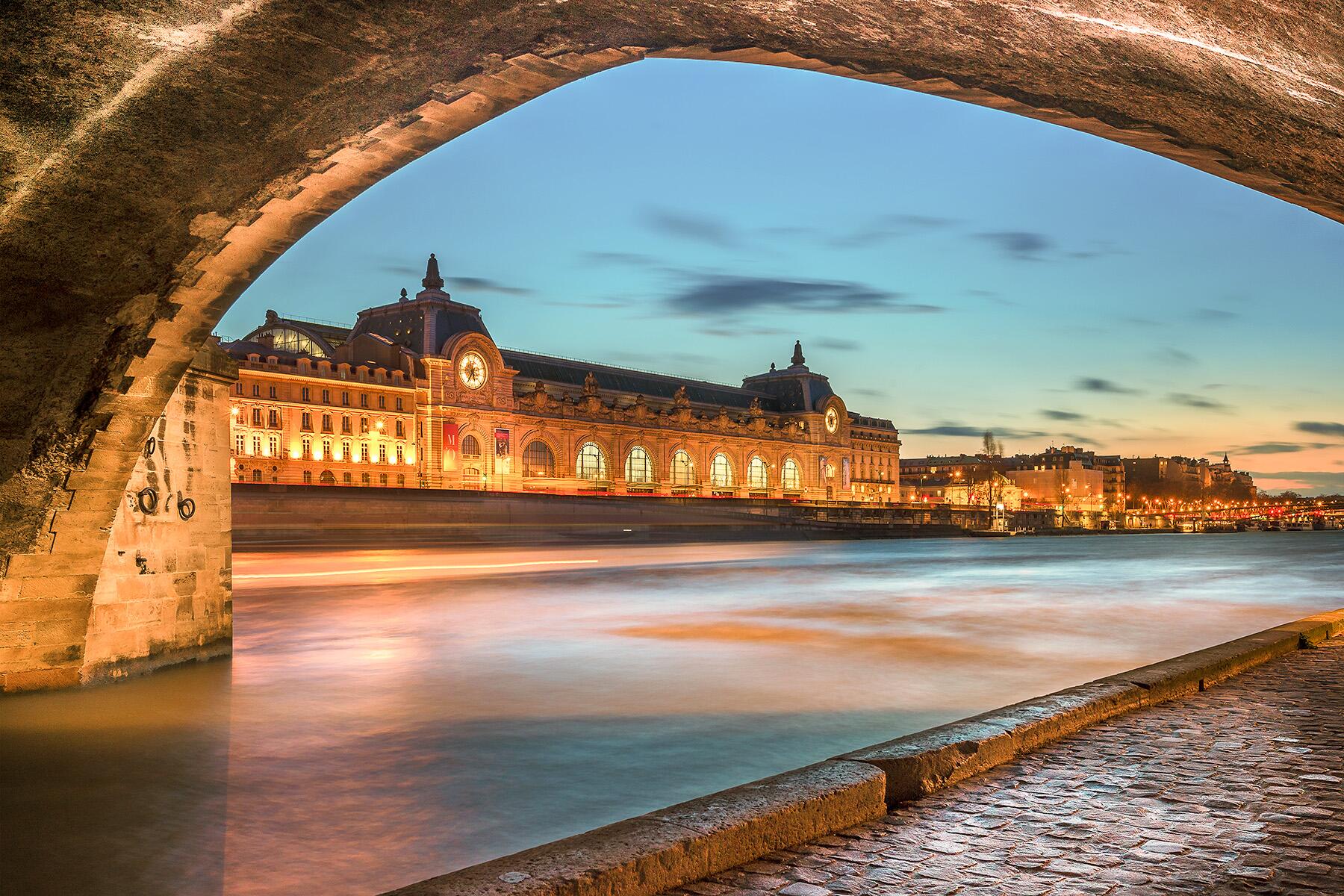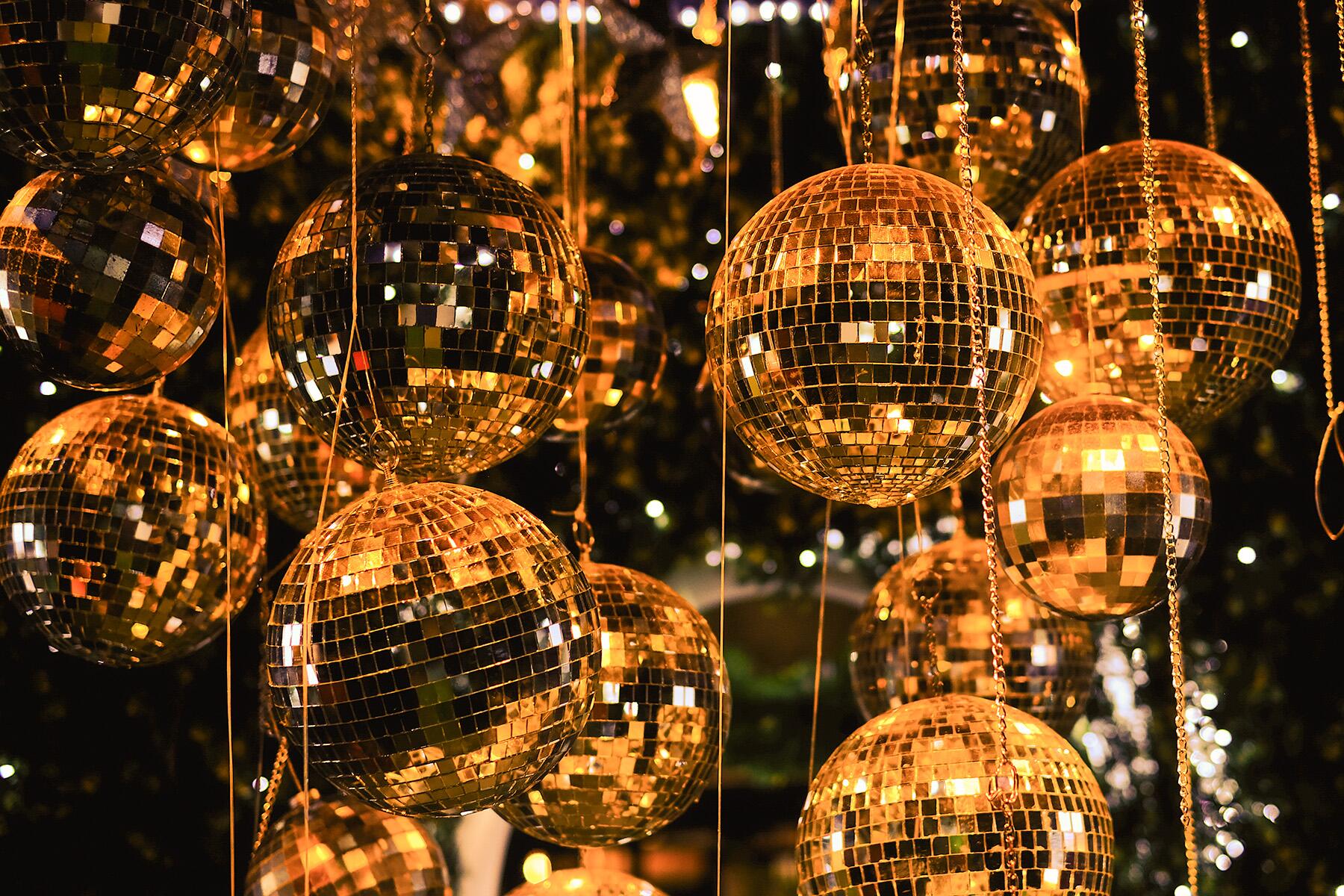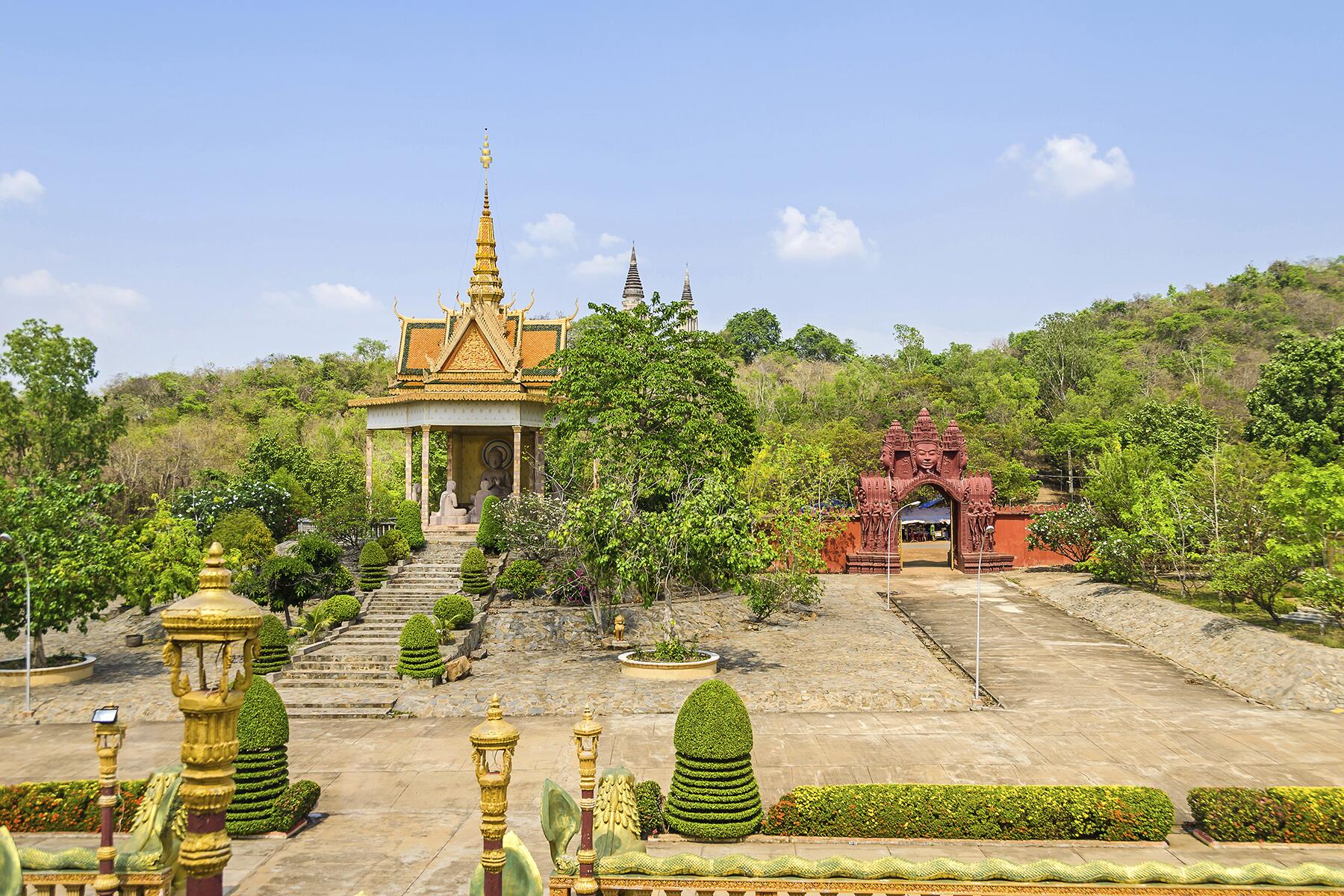Perhaps I didn’t need a Vipassana retreat to cure my illnesses.
A woman in a wide-brimmed hat walked into me, knocking my shoulder. There’s no way she didn’t see me coming down the wide path lined with fruit trees. I’m a sweaty mess at the Vipassana Meditation Centre. Did I start a beef at a silent retreat? Then her hand found mine, shoving something hard and crinkly into my palm. A candy. Contraband.
Trying not to make eye contact, I glanced at her face. Signs of age were just starting to show around her eyes; she smiled and walked away. I turned from the meditation hall—a grand white building with a red tiled roof standing starkly against the squat dormitories of the center and took the forbidden candy back to my dorm. Walking is the only form of exercise allowed at the center. Also on the list of banned activities: talking, making eye contact, reading, writing, listening to music, or masturbating.
Ten days at a silent retreat may not top every traveler’s wish list to Cambodia. But, for a chronically ill traveler like myself, the allure of better health is irresistible. Vipassana practitioners can’t promise that their retreats are a cure for everything from heart disease to crime rates, but they do suggest it as a possibility. S.N Goenka, leader of the Vipassana Movement, started the practice to cure his migraines (and anger problems). So, with Chronic Fatigue Syndrome (CFS) and Polycystic Ovary Syndrome (PCOS) impacting my health, it seemed like a worthwhile pursuit.
Recommended Fodor’s Video
The Grueling Retreat Schedule
After popping the candy in my mouth, a sweet respite amid six days of rice and vegetables, I decided to nap before the next “strong” (i.e. mandatory) meditation. The 4 a.m. wake-up call is no joke—and also mandatory. There’s no “listening to your body” or “following your heart” here. The schedule was the schedule.

I’m so averse to early mornings that I missed the bus from Phnom Penh on the first day of the retreat. The intrepid traveler I am, I found my way alone by bus, then tuk-tuk, bouncing along bumpy roads with vistas of rice paddies and farmland.
Check-in volunteers locked away my phone and wallet. But I didn’t offer up my Kindle. I promised myself it’s only because I’m afraid it’ll get lost—I won’t use it. Unless I, like, really needed to.
In the meditation hall, the teachers sat on raised blocks in front of the students, divided by gender, a row of monks in orange robes on the men’s side. The rest of us were on cushions on the floor. A bell chimed. This is it! I’m meditating! Sure, my brain was buzzy, and my legs kept falling asleep. But that’s to be expected in the first session!
The Dreaded Discourse
The two other female foreigners and I were escorted into the bamboo-walled dining hall for the English language discourse in the evening. On recorded video circa 1990, we met our Vipassana founder and teacher, S.N Goenka. He’s a portly man who often paused in his speech as if each word he uttered was weighty and important. He assured us that Vipassana isn’t a religion; anyone can practice it.
Throughout the retreat, he repeated this sentiment so often that I began to feel like I’m listening to a Jews for Jesus sermon, trying to convince me that no, I don’t need to convert to Buddhism to accept Vipassana as my lord and savior.

Goenka is a Buddhist, having converted from Hinduism after studying Vipassana, and his talks are littered with teachings of the Buddha. I later learned the term tacit conversion–a type of rhetoric that renders the conversion invisible to the new recruit.
When the lights went out at 9:30 p.m., I tossed and turned under the bug net of my narrow bed. I often struggle with insomnia, but I was sure that with all the meditation and no artificial light, my internal clock would sync up with nature. All I needed was to be dragged out of bed at four in the morning a few times, and my clock would switch right over. Would it be really breaking the rules to read, just for the first night?
As the days trickled on, the 4 a.m. wake-up bell always rang on time, but falling asleep never got easier. Each day, I hid my Kindle at the bottom of my bag, vowing that I’m done with cheating. Every night, I fished it out again. Who am I? Someone who encourages banning books!? Only the classics, I bargained with myself. Meditative reading. I started The Canterbury Tales.
Dreaming of Freedom
By the morning of day five, one of the other foreigners was gone. Did she leave? Was she banished? I couldn’t stand that I’d have to wait five days to find out. My mind imagined stories of her departure, and I wondered if I’ll ever get my phone back. The center felt like a compound, and the staff’s strict adherence to the rules made me feel like I might never get out.

Four days before the retreat ends, things were looking up. I was more focused in meditation. The pain in my knees and back wasn’t so bad. The Canterbury Tales were more boring, sexist, and racist than I thought, but here, it’s basically Game of Thrones, and I had laser focus. By day eight, my optimism was gone. Goenka started talking more (via recording) during meditation sessions, and hearing his voice grated me. I tried to remember why I wanted to do this in the first place, but all I could think about was how badly I want a cheeseburger. I counted the hours until it’s time to leave. Hours! It’s hours until the end!
On day 10, the silence was broken. The mood of the retreat changed from solemn to joyful. My dining hall neighbor was bursting with chatter. We didn’t share language, but she taught me the names of the foods we were eating: Kari – Amok – Nhoam. I suffered through one final discourse session and went to sleep. Only one more 4 a.m. wake up. When I got my phone back, I almost couldn’t believe it. I was free.
Exploring Cambodia
In Siem Reap, I gorged on a cheeseburger and fries. I got a solid eight hours of sleep and woke up feeling refreshed. Did the meditation help lower my cortisol levels, a symptom of PCOS? Or was I just relieved I didn’t have to wake up well before dawn?
I don’t often hire tour guides—why interact with humans when you can read things on plaques? But after ten days in silence, I was craving connection, so I took a guide with me to the temple complexes around Siem Reap. In the sandstone temples, covered in carvings of Hindu and Buddhist motifs, he told me about the history of the Khmer Empire woven with stories of modern Cambodia.
I learned that the Khmer Empire built one of the world’s first public healthcare systems. Neak Pean, a hospital temple, sits on an island in a man-made lake, symbolizing the mythical Anavatapa, a lake in the Himalayas said to have curative powers. While no one knows for sure why King Jayavarman VII built healing temples staffed with priests and doctors, one theory is that it made the transition from Hinduism to Buddhism more palatable.
I’m reminded of S.N Goenka’s conversion, influenced by the health benefits he received from practicing Vipassana. Was public healthcare King Javaraman’s system of tacit conversion?
My time in Siem Reap ended at Phnom Baking. Famous for its sunsets, the popularity of this temple has put it at risk of collapse. It was built as an homage to Mount Meru, the home of the Hindu gods, but it was later converted to a Buddhist temple. The line to enter is a mix of foreign and Cambodian tourists hoping to make it to the top in time to catch the sunset. I climbed to the top as the sun turned orange and pink, bathing the city in a rosy light.
Since the retreat, I’d barely looked at my phone. The pull to scroll or text friends was gone. I wanted to fully feel where I am right now, at this temple whose beauty led to its destruction. Perhaps I didn’t need Vipassana to cure my illnesses. Maybe I took away the lessons I needed. Our bodies, beautiful and flawed, are crumbling in decay. As I looked around at the gathered crowd, it’s with a new appreciation for the beauty of every fleeting, crumbling moment. Or maybe it’s a relief that I wouldn’t have to sit through another discourse session.



